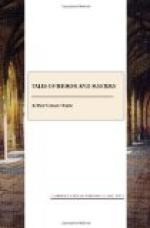“When we stopped at Willesden, I instantly changed my carriage. It appears that I was not seen to do so, which is not surprising, as the station was crowded with people. MacCoy, of course, was expecting me, and he had spent the time between Euston and Willesden in saying all he could to harden my brother’s heart and set him against me. That is what I fancy, for I had never found him so impossible to soften or to move. I tried this way and I tried that; I pictured his future in an English gaol; I described the sorrow of his mother when I came back with the news; I said everything to touch his heart, but all to no purpose. He sat there with a fixed sneer upon his handsome face, while every now and then Sparrow MacCoy would throw in a taunt at me, or some word of encouragement to hold my brother to his resolutions.
“`Why don’t you run a Sunday-school?’ he would say to me, and then, in the same breath: `He thinks you have no will of your own. He thinks you are just the baby brother and that he can lead you where he likes. He’s only just finding out that you are a man as well as he.’
“It was those words of his which set me talking bitterly. We had left Willesden, you understand, for all this took some time. My temper got the better of me, and for the first time in my life I let my brother see the rough side of me. Perhaps it would have been better had I done so earlier and more often.
“`A man!’ said I. `Well, I’m glad to have your friend’s assurance of it, for no one would suspect it to see you like a boarding-school missy. I don’t suppose in all this country there is a more contemptible-looking creature than you are as you sit there with that Dolly pinafore upon you.’ He coloured up at that, for he was a vain man, and he winced from ridicule.
“`It’s only a dust-cloak,’ said he, and he slipped it off. `One has to throw the coppers off one’s scent, and I had no other way to do it.’ He took his toque off with the veil attached, and he put both it and the cloak into his brown bag. `Anyway, I don’t need to wear it until the conductor comes round,’ said he.
“`Nor then, either,’ said I, and taking the bag I slung it with all my force out of the window. `Now,’ said I, `you’ll never make a Mary Jane of yourself while I can help it. If nothing but that disguise stands between you and a gaol, then to gaol you shall go.’
“That was the way to manage him. I felt my advantage at once. His supple nature was one which yielded to roughness far more readily than to entreaty. He flushed with shame, and his eyes filled with tears. But MacCoy saw my advantage also, and was determined that I should not pursue it.
“`He’s my pard, and you shall not bully him,’ he cried.
“`He’s my brother, and you shall not ruin him,’ said I. `I believe a spell of prison is the very best way of keeping you apart, and you shall have it, or it will be no fault of mine.’




